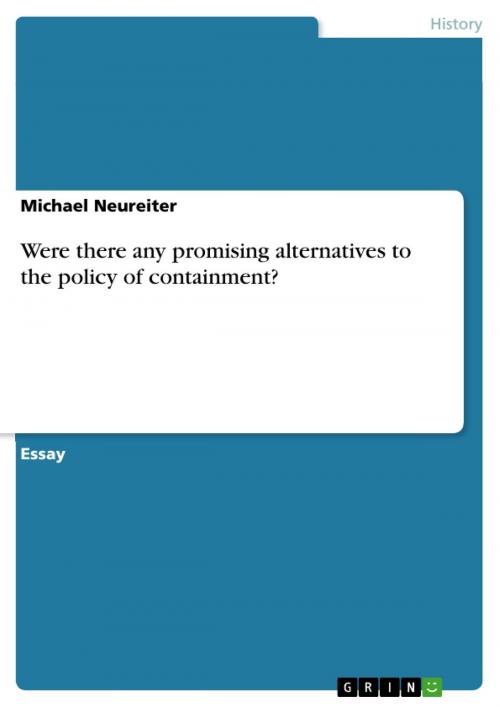Were there any promising alternatives to the policy of containment?
Nonfiction, History, European General| Author: | Michael Neureiter | ISBN: | 9783640870479 |
| Publisher: | GRIN Publishing | Publication: | March 17, 2011 |
| Imprint: | GRIN Publishing | Language: | English |
| Author: | Michael Neureiter |
| ISBN: | 9783640870479 |
| Publisher: | GRIN Publishing |
| Publication: | March 17, 2011 |
| Imprint: | GRIN Publishing |
| Language: | English |
Essay from the year 2010 in the subject History Europe - Germany - Postwar Period, Cold War, grade: 1,0, Augustana University of Applied Sciences Neuendettelsau, course: U.S. History: From World Word II to Present, language: English, abstract: In 1947, when U.S. President Harry S. Truman and his key foreign policy aides finally became aware of the threat posed by Soviet expansionism, they decided to stall the spread of communism and to halt Stalin's aggressive ambitions. Their strategy became known as the 'policy of containment', which was first outlined by President Truman in his 1947 'Truman Doctrine', stating that Soviet expansionism poses a serious threat to the freedom of peoples all over the world. Therefore, it must be the goal of the United States to prevent the Soviet sphere of influence from expanding, but also to prevent a third world war by not intervening in the already existing Soviet sphere of influence. But not everyone in America was happy with this way of dealing with the Soviet threat. Different actors opposed the policy of containment for different reasons and came up with their own, alternative ways of how to deal with the worldwide spread of communism. Main critics of the containment policy included parts of the Republican Party, various isolationists and famous journalist Walter Lippmann. In this essay, I will uphold the view that there were no promising alternatives to the policy of containment by first rejecting these three alternatives and then showing that the policy of containment was a rather efficient and safe way to face Soviet expansionism.
Essay from the year 2010 in the subject History Europe - Germany - Postwar Period, Cold War, grade: 1,0, Augustana University of Applied Sciences Neuendettelsau, course: U.S. History: From World Word II to Present, language: English, abstract: In 1947, when U.S. President Harry S. Truman and his key foreign policy aides finally became aware of the threat posed by Soviet expansionism, they decided to stall the spread of communism and to halt Stalin's aggressive ambitions. Their strategy became known as the 'policy of containment', which was first outlined by President Truman in his 1947 'Truman Doctrine', stating that Soviet expansionism poses a serious threat to the freedom of peoples all over the world. Therefore, it must be the goal of the United States to prevent the Soviet sphere of influence from expanding, but also to prevent a third world war by not intervening in the already existing Soviet sphere of influence. But not everyone in America was happy with this way of dealing with the Soviet threat. Different actors opposed the policy of containment for different reasons and came up with their own, alternative ways of how to deal with the worldwide spread of communism. Main critics of the containment policy included parts of the Republican Party, various isolationists and famous journalist Walter Lippmann. In this essay, I will uphold the view that there were no promising alternatives to the policy of containment by first rejecting these three alternatives and then showing that the policy of containment was a rather efficient and safe way to face Soviet expansionism.















